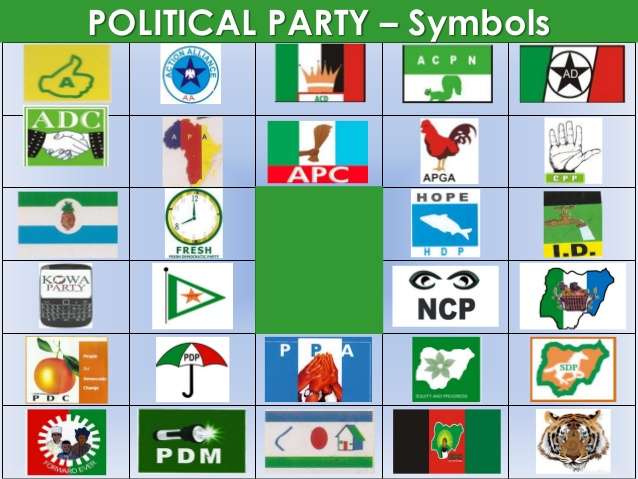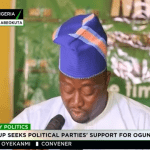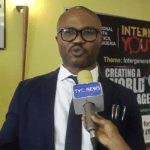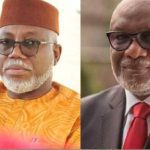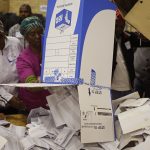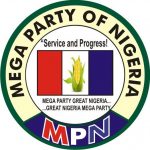 The number of political parties in Nigeria has increased from its previous figure of 27 in the 2015 general election to 68.This has been identified as a cause for grave concern by the Center For Democratic Development which organised an interactive session to deliberate on it.
The number of political parties in Nigeria has increased from its previous figure of 27 in the 2015 general election to 68.This has been identified as a cause for grave concern by the Center For Democratic Development which organised an interactive session to deliberate on it.
An election is a decision making process by which population chooses an people choose their leaders.
In the Nigerian context as indeed in most parts of the world, these leaders must belong to a political party, in accordance with section 222 of the 1999 constitution.
As citizens ready themselves to return to the polls in 2019, the Independent National Electoral Commission (INEC) is now burdened with the challenge of how to customise ballot papers to duly represent all 68 registered political parties.
An interactive session was held by the Nigerian Political Parties Discussion Series (NPPDS), to deliberate on the increasing number of political parties in Nigeria and access to the ballot in 2019.
Participants argue that for Nigeria political system to move forward, the number of political parties do not count but the ideology they offer if democracy must be deepened.
Analysts at the event are of the view that the existence of more than one party gives citizens the opportunity to make a choice about who trust their mandate.
.
 The number of political parties in Nigeria has increased from its previous figure of 27 in the 2015 general election to 68.This has been identified as a cause for grave concern by the Center For Democratic Development which organised an interactive session to deliberate on it.
The number of political parties in Nigeria has increased from its previous figure of 27 in the 2015 general election to 68.This has been identified as a cause for grave concern by the Center For Democratic Development which organised an interactive session to deliberate on it.
An election is a decision making process by which population chooses an people choose their leaders.
In the Nigerian context as indeed in most parts of the world, these leaders must belong to a political party, in accordance with section 222 of the 1999 constitution.
As citizens ready themselves to return to the polls in 2019, the Independent National Electoral Commission (INEC) is now burdened with the challenge of how to customise ballot papers to duly represent all 68 registered political parties.
An interactive session was held by the Nigerian Political Parties Discussion Series (NPPDS), to deliberate on the increasing number of political parties in Nigeria and access to the ballot in 2019.
Participants argue that for Nigeria political system to move forward, the number of political parties do not count but the ideology they offer if democracy must be deepened.
Analysts at the event are of the view that the existence of more than one party gives citizens the opportunity to make a choice about who trust their mandate.
.
 The number of political parties in Nigeria has increased from its previous figure of 27 in the 2015 general election to 68.This has been identified as a cause for grave concern by the Center For Democratic Development which organised an interactive session to deliberate on it.
The number of political parties in Nigeria has increased from its previous figure of 27 in the 2015 general election to 68.This has been identified as a cause for grave concern by the Center For Democratic Development which organised an interactive session to deliberate on it.
An election is a decision making process by which population chooses an people choose their leaders.
In the Nigerian context as indeed in most parts of the world, these leaders must belong to a political party, in accordance with section 222 of the 1999 constitution.
As citizens ready themselves to return to the polls in 2019, the Independent National Electoral Commission (INEC) is now burdened with the challenge of how to customise ballot papers to duly represent all 68 registered political parties.
An interactive session was held by the Nigerian Political Parties Discussion Series (NPPDS), to deliberate on the increasing number of political parties in Nigeria and access to the ballot in 2019.
Participants argue that for Nigeria political system to move forward, the number of political parties do not count but the ideology they offer if democracy must be deepened.
Analysts at the event are of the view that the existence of more than one party gives citizens the opportunity to make a choice about who trust their mandate.
.
 The number of political parties in Nigeria has increased from its previous figure of 27 in the 2015 general election to 68.This has been identified as a cause for grave concern by the Center For Democratic Development which organised an interactive session to deliberate on it.
The number of political parties in Nigeria has increased from its previous figure of 27 in the 2015 general election to 68.This has been identified as a cause for grave concern by the Center For Democratic Development which organised an interactive session to deliberate on it.
An election is a decision making process by which population chooses an people choose their leaders.
In the Nigerian context as indeed in most parts of the world, these leaders must belong to a political party, in accordance with section 222 of the 1999 constitution.
As citizens ready themselves to return to the polls in 2019, the Independent National Electoral Commission (INEC) is now burdened with the challenge of how to customise ballot papers to duly represent all 68 registered political parties.
An interactive session was held by the Nigerian Political Parties Discussion Series (NPPDS), to deliberate on the increasing number of political parties in Nigeria and access to the ballot in 2019.
Participants argue that for Nigeria political system to move forward, the number of political parties do not count but the ideology they offer if democracy must be deepened.
Analysts at the event are of the view that the existence of more than one party gives citizens the opportunity to make a choice about who trust their mandate.
.
 The number of political parties in Nigeria has increased from its previous figure of 27 in the 2015 general election to 68.This has been identified as a cause for grave concern by the Center For Democratic Development which organised an interactive session to deliberate on it.
The number of political parties in Nigeria has increased from its previous figure of 27 in the 2015 general election to 68.This has been identified as a cause for grave concern by the Center For Democratic Development which organised an interactive session to deliberate on it.
An election is a decision making process by which population chooses an people choose their leaders.
In the Nigerian context as indeed in most parts of the world, these leaders must belong to a political party, in accordance with section 222 of the 1999 constitution.
As citizens ready themselves to return to the polls in 2019, the Independent National Electoral Commission (INEC) is now burdened with the challenge of how to customise ballot papers to duly represent all 68 registered political parties.
An interactive session was held by the Nigerian Political Parties Discussion Series (NPPDS), to deliberate on the increasing number of political parties in Nigeria and access to the ballot in 2019.
Participants argue that for Nigeria political system to move forward, the number of political parties do not count but the ideology they offer if democracy must be deepened.
Analysts at the event are of the view that the existence of more than one party gives citizens the opportunity to make a choice about who trust their mandate.
.
 The number of political parties in Nigeria has increased from its previous figure of 27 in the 2015 general election to 68.This has been identified as a cause for grave concern by the Center For Democratic Development which organised an interactive session to deliberate on it.
The number of political parties in Nigeria has increased from its previous figure of 27 in the 2015 general election to 68.This has been identified as a cause for grave concern by the Center For Democratic Development which organised an interactive session to deliberate on it.
An election is a decision making process by which population chooses an people choose their leaders.
In the Nigerian context as indeed in most parts of the world, these leaders must belong to a political party, in accordance with section 222 of the 1999 constitution.
As citizens ready themselves to return to the polls in 2019, the Independent National Electoral Commission (INEC) is now burdened with the challenge of how to customise ballot papers to duly represent all 68 registered political parties.
An interactive session was held by the Nigerian Political Parties Discussion Series (NPPDS), to deliberate on the increasing number of political parties in Nigeria and access to the ballot in 2019.
Participants argue that for Nigeria political system to move forward, the number of political parties do not count but the ideology they offer if democracy must be deepened.
Analysts at the event are of the view that the existence of more than one party gives citizens the opportunity to make a choice about who trust their mandate.
.
 The number of political parties in Nigeria has increased from its previous figure of 27 in the 2015 general election to 68.This has been identified as a cause for grave concern by the Center For Democratic Development which organised an interactive session to deliberate on it.
The number of political parties in Nigeria has increased from its previous figure of 27 in the 2015 general election to 68.This has been identified as a cause for grave concern by the Center For Democratic Development which organised an interactive session to deliberate on it.
An election is a decision making process by which population chooses an people choose their leaders.
In the Nigerian context as indeed in most parts of the world, these leaders must belong to a political party, in accordance with section 222 of the 1999 constitution.
As citizens ready themselves to return to the polls in 2019, the Independent National Electoral Commission (INEC) is now burdened with the challenge of how to customise ballot papers to duly represent all 68 registered political parties.
An interactive session was held by the Nigerian Political Parties Discussion Series (NPPDS), to deliberate on the increasing number of political parties in Nigeria and access to the ballot in 2019.
Participants argue that for Nigeria political system to move forward, the number of political parties do not count but the ideology they offer if democracy must be deepened.
Analysts at the event are of the view that the existence of more than one party gives citizens the opportunity to make a choice about who trust their mandate.
.
 The number of political parties in Nigeria has increased from its previous figure of 27 in the 2015 general election to 68.This has been identified as a cause for grave concern by the Center For Democratic Development which organised an interactive session to deliberate on it.
The number of political parties in Nigeria has increased from its previous figure of 27 in the 2015 general election to 68.This has been identified as a cause for grave concern by the Center For Democratic Development which organised an interactive session to deliberate on it.
An election is a decision making process by which population chooses an people choose their leaders.
In the Nigerian context as indeed in most parts of the world, these leaders must belong to a political party, in accordance with section 222 of the 1999 constitution.
As citizens ready themselves to return to the polls in 2019, the Independent National Electoral Commission (INEC) is now burdened with the challenge of how to customise ballot papers to duly represent all 68 registered political parties.
An interactive session was held by the Nigerian Political Parties Discussion Series (NPPDS), to deliberate on the increasing number of political parties in Nigeria and access to the ballot in 2019.
Participants argue that for Nigeria political system to move forward, the number of political parties do not count but the ideology they offer if democracy must be deepened.
Analysts at the event are of the view that the existence of more than one party gives citizens the opportunity to make a choice about who trust their mandate.
.

